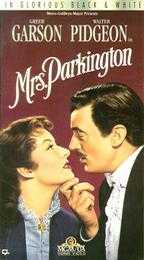Mrs. Parkington
| Mrs. Parkington | |
|---|---|
 DVD cover | |
| Directed by | Tay Garnett |
| Produced by | Leon Gordon |
| Written by |
Robert Thoeren Polly James Louis Bromfield (novel) |
| Starring |
Greer Garson Walter Pidgeon |
| Music by | Bronislau Kaper |
| Cinematography | Joseph Ruttenberg |
| Editing by | George Boemler |
| Distributed by | Metro-Goldwyn-Mayer |
| Release dates |
|
| Running time | 124 minutes |
| Country | United States |
| Language | English |
| Budget | $1,574,000[1] |
| Box office | $5,631,000[1] |
Mrs. Parkington is a 1944 drama film.[2][3] It tells the story of a woman's life, told in flashbacks, from hotel maid to society matron. The movie was adapted by Polly James and Robert Thoeren from the novel by Louis Bromfield. It was directed by Tay Garnett and starred Greer Garson and Walter Pidgeon.
Synopsis
Susie Parkington, an elderly society matron, is surrounded by her many relatives at her stately home at Christmastime, with the exception of her beloved great-granddaughter Jane. When Jane does appear she informs her great-grandmother that she plans to elope with Ned Talbot, her father's employee who wishes to take her away from her family and their way of life. Susie arranges a meeting with Ned, where he reveals that Jane's father Amory is being questioned for fraud and he planned to take Jane away in order to hide her from the truth. Susie sends Ned away, telling Jane to forget about him, and after hearing her grandson-in-law's side of the story makes the decision to pay off Amory's debts ($31 million), much to her family's disgust, as it will mean that they will lose their inheritance.
During her family's bickering Susie begins to have flashbacks of her own humble beginnings; she was a chambermaid at her mother's modest guesthouse. It was there that she met the wealthy Major Augustus Parkington, and following her mother's death they marry. Shortly after the marriage Susie is introduced to Baroness Aspasia Conti, a French aristocrat and close friend of Augustus, who helps Susie pick out clothes, accessories and even a house. Susie, originally grateful for Aspasia's help, soon grows tired of her interference in her marriage and announces that she is pregnant by her husband. An elated Augustus holds a ball to celebrate, but his happiness turns to fury when a great number of people refuse to attend due to Augustus' feud with a wealthy businessman. His rage upsets Susie, and when she runs after her husband to comfort him she stumbles and miscarries their baby. In his anger Augustus blames his neighbours for Susie's miscarriage and vows to get revenge.
Four years pass and it transpires that Augustus has managed to put many of their neighbours out of business on Wall Street. After one of their neighbours, Mrs. Livingstone, fills Susie in on her husband's deeds and pleads with her to speak to Augustus about putting her husband out of business, Susie leaves her husband and moves in with Aspasia. Several weeks pass before Augustus begs his wife to return home, revealing that he has been unsuccessful in his mission to put the Livingstones out of business. Susie then informs him that she has been financially supporting the Livingstones' business and that his vendetta with their neighbours has got to stop. Augustus agrees and the couple reunite.
Their marriage faces further troubles, however, when the Parkingtons' son Herbert dies. Susie becomes a recluse for a year and Augustus takes to their country home in England. Aspasia manages to convince Susie to fight for her marriage which, with the Prince of Wales' help, she does. Following this Aspasia reveals that she will be leaving the Parkingtons and moving back to Paris as she is dying. She also reveals to Susie that she has always been in love with Augustus, to which Susie shocks her by revealing she knows. After Aspasia departs for France, Augustus and Susie have a heart-to-heart discussion about their family, during which Augustus reveals that despite loathing those who receive money without deserving it, their children will lack for nothing as long as they know the value of money.
It is at this point Susie realises her misgivings about her family; they have rejected her offer to bail Amory out for fear of losing their inheritance, meaning that he will be sent to prison. Seeing how distraught Jane is, having lost both her father and her lover, Susie makes the decision to bail Amory out anyway and tells Jane to follow her heart and go after Ned. Her family flee the home in disgust after learning they will be cut off by their mother, whilst Susie gleefully decides she will return to her childhood home at the guest house and start again.
Awards
Garson was nominated for Academy Awards for Best Actress and Agnes Moorehead for Best Supporting Actress. Moorehead also won the Golden Globe for Best Supporting Actress.
Cast
- Greer Garson as Susie Parkington
- Walter Pidgeon as Major Augustus Parkington
- Edward Arnold as Amory Stilham
- Agnes Moorehead as Baroness Aspasia Conti
- Cecil Kellaway as Edward, Prince of Wales
- Gladys Cooper as Alice, Duchess de Brancourt
- Frances Rafferty as Jane Stilham
- Tom Drake as Ned Talbot
- Peter Lawford as Lord Thornley
- Dan Duryea as Jack Stilham
- Hugh Marlowe as John Marbey
Box Office
According to MGM records the film earned $3,062,000 in the US and Canada and $2,569,000 elsewhere resulting in a profit of $2,198,000.[1]
References
External links
- Mrs. Parkington at the Internet Movie Database
- Mrs. Parkington at the TCM Movie Database
- Monster Hunter review
| |||||||||||||||||